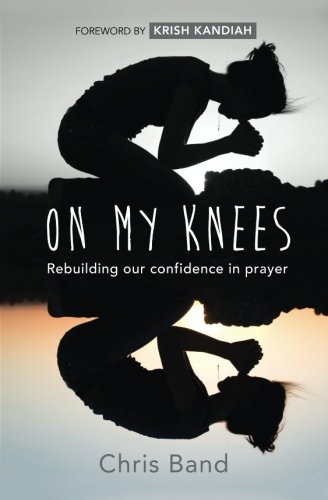Rebuilding our confidence in prayer
Baptist minister Chris Band was overwhelmed with questions about prayer. It led to a deep study, lengthy interviews... and a book called On My Knees. He shares some of that journey
 A while ago I was diagnosed with ‘clergyman’s knee’. This condition, also known as ‘housemaid’s knee’, is common among those whose work involves lots of kneeling. My doctor, knowing that I’m a Baptist minister, was understandably sheepish when she asked whether I spent much time on my knees.
A while ago I was diagnosed with ‘clergyman’s knee’. This condition, also known as ‘housemaid’s knee’, is common among those whose work involves lots of kneeling. My doctor, knowing that I’m a Baptist minister, was understandably sheepish when she asked whether I spent much time on my knees.
And I had to admit that I didn’t. But, scared she might jump to the wrong conclusion, I quickly added, ‘I do pray, by the way, but I tend to pace around the room a lot.’ She replied: ‘Well it doesn’t really matter which position you pray from does it?’
Is that true I wonder? Does the position from which we pray matter? Perhaps not so much our physical posture, as the doctor was clearly alluding to.
But I am convinced that the theological position from which we pray matters a great deal. It really does matter whom we consider God to be and how we understand him to be at work in the world. And without a solid grasp of these twin pillars for prayer, our understanding can succumb to mere proof texting and wishful thinking with the inevitable result that we end up on our knees not so much in prayer as in defeat.
Certainly for me, around ten years ago, my questions about prayer had multiplied to such an extent that they were overwhelming me. Why is it that one person gets healed but another doesn’t? If prayer can change the weather then shouldn’t we be praying for an end to drought rather than for sunny days for church BBQs? Is God really interested in prayers for parking spaces? And why isn’t he doing all he can anyway for the world he loves, whether or not we pray?
These questions, and many others, led me to a deep study of prayer which included lots of biblical and theological reading and, along with that, long interviews with members of my own congregation to find out what they themselves thought.
I discovered, to my surprise, that many had come to regard God as somewhat ‘under-involved’ in the world. Their confidence in prayer had been knocked over the years by what they regarded to be God’s divine plan of inaction.
Others saw him as ‘over-involved’ in the sense that they understood God to have determined everything in advance. But these folk too were wrestling with prayer, struggling to see how their requests could make a difference if God’s will was going to happen anyway.
My aim, in writing On my Knees, has been to lay a solid biblical foundation on which we, as living temples, can build an enduring house of prayer, fit to withstand the tests and trials of experience.
Part of this involves positioning our requests within the wider context of relationship and rule: prayer is both an outworking of the relationship that we enjoy with our Heavenly Father and an expression of the ‘shared rule’ in which God enlists us, the co-builders of his Kingdom. As an inherently relational enterprise, prayer calls us into the company of others. It calls us into the company of the Father, Son and Spirit who are constantly giving and receiving prayer on our behalf. And it also calls us alongside one-another because, as the teaching and practice of Jesus make clear, solitary prayer is only half of the story.
And there are important principles that need to guide the manner of our praying such as faith, persistence and desire. The requirement to pray with faith can appear daunting at first but the good news is that only a mustard seed amount of genuine faith, the faith that knows that ‘God is able’, is needed to see him move. The requirement for persistence might not be obvious given the infallibility of God’s memory and the enormity of his love.
But since the journey from first request to final answer is often lengthy, faithfulness in prayer calls us to persevere through each twist and turn of that journey. And praying with desire is vital because God longs to take our half-hearted and absent-minded requests and transform them with his own fervent longing.
If our knowledge about prayer is like an island, then the coastline represents the limits of our knowledge, the place where questions begin to arise. I have found that many of my own questions about prayer have been answered through writing this book.
But as the island has grown, so has the coastline! Yes there will always be questions because God hasn’t told us everything that we may like to know about prayer.
But since he has told us enough, let’s place our faith in him for what we know and offer him our trust for what we don’t.
On My Knees: Rebuilding our confidence in prayer by Chris Band is accompanied by a website which contains, among other things, a free small group study guide.
Chris Band is a minister at Headington Baptist Church, Oxford
Baptist Times, 19/05/2017